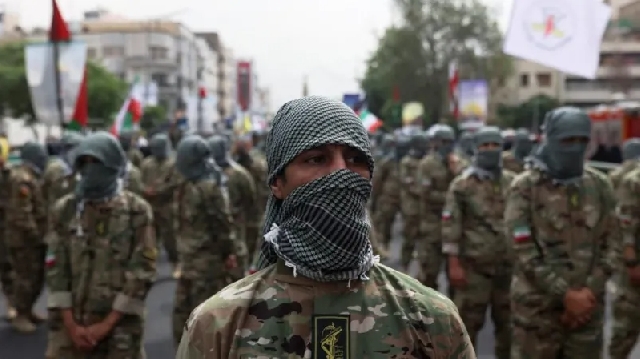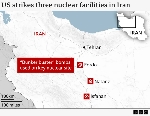Iran using criminal gangs for hit jobs abroad, court papers show
 Islamic Revolutionary Guard Corps special forces (Pic): US and Israeli intelligence have accused Iran's elite Revolutionary Guards of planning attacks abroad
Islamic Revolutionary Guard Corps special forces (Pic): US and Israeli intelligence have accused Iran's elite Revolutionary Guards of planning attacks abroad
There has been a sharp rise in plots by the Iranian regime to kidnap or assassinate dissidents, journalists and political foes living abroad, according to reports by Western intelligence agencies.
These attempts have escalated dramatically since 2022, with even US President Donald Trump among the alleged targets. In the UK, police are questioning a number of Iranians arrested earlier this month on suspicion of planning a terrorist attack. The BBC understands the alleged target was the Israeli embassy in London.
And court documents from Turkey and the US - seen by BBC Eye Investigations and BBC Persian - contain evidence that Iran has been hiring criminal gangs to carry out killings on foreign soil, allegations the Iranian regime has previously denied. Iranian officials did not respond to a fresh request for a comment.
One name repeatedly surfaced in these documents: Naji Sharifi Zindashti, an Iranian criminal boss, known for international drug smuggling.
His name appeared in a Turkish indictment in connection with the 2017 killing in Istanbul of Saeed Karimian, the head of a Persian TV network that broadcast Western films and programmes to Iran.
Iranian authorities considered Karimian a threat to Islamic values, and three months before his assassination an Islamic Revolutionary Court in Tehran sentenced him in absentia to six years in prison.
US and Turkish officials believed his death was related to a mafia feud.
But when in 2019, Massoud Molavi, a defector from Iran's Islamic Revolution Guard Corps (IRGC), was gunned down in Istanbul, it shed light on Zindashti's alleged role in Karimian's assassination.
Molavi had been exposing corruption at the highest levels of Iran's leadership. The Turkish police discovered Zindashti's gardener had been present at the scene of Molavi's assassination, and that his driver had been at Karimian's murder.
The police suspected the gardener and the driver had been sent by Zindashti.
Zindashti was arrested in connection with Karimian's death but was controversially released after just six months, causing a legal scandal in Turkey. A Higher Court judge ordered his rearrest but by then he had left the country.
He then fled to Iran, raising suspicions that he might have been working for Iranian intelligence all along.
Cengiz Erdinc, a Turkish investigative journalist, claims that when those out of favour with the Iranian regime are killed, Zindashti's men are at the scene. "It is not the first time, but there has always been a connection between organised crime and the intelligence agencies," he says.
Over three decades ago, he was convicted of drug smuggling in Iran and sentenced to death. But rumours suggested his escape from prison, which led him to Turkey, may have been orchestrated by Iranian intelligence.
"If someone sentenced to death in Iran escapes after killing a guard, they're unlikely to make it out alive - unless there's more to the story," says someone who knew Zindashti closely. The BBC is withholding their identity for their own safety.
"The only plausible way for him to return and live freely would be if he had been working for Iran's intelligence services, making his escape appear to be part of a planned cover story for intelligence work with Iran's security agencies and IRGC," they told BBC World Service.
Source: bbc.com
Trending World

India sends its first astronaut into space in 41 years
14:17
US gained nothing from strikes, Iran's supreme leader says
01:38
Trump calls for end to Netanyahu corruption trial
01:31
US Supreme Court allows parents to opt out of lessons with LGBT books
19:03
Iranian foreign minister admits serious damage to nuclear sites
20:52
DR Congo and Rwanda sign long-awaited peace deal in Washington
20:49
Trump says he has 'a group of very wealthy people' to buy TikTok
17:28
'Unprecedented' alerts in France as blistering heat grips Europe
17:26
One of Nigeria’s richest men set to be buried in Saudi Arabia
13:53
Queen of Katwe's gambit still in play for Uganda's slum chess players
13:42




